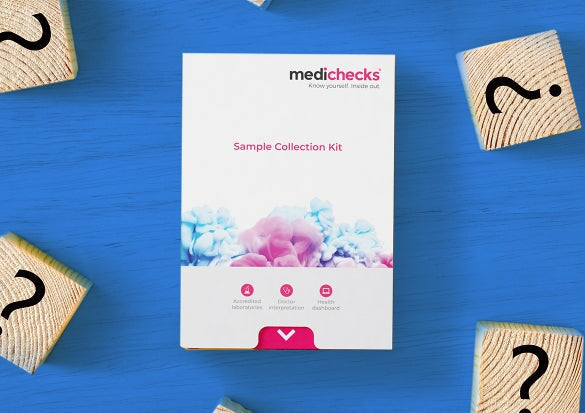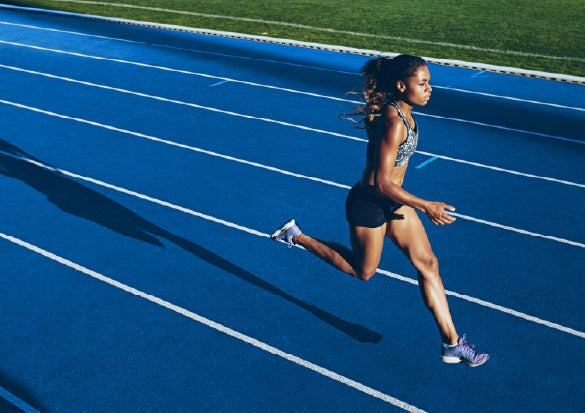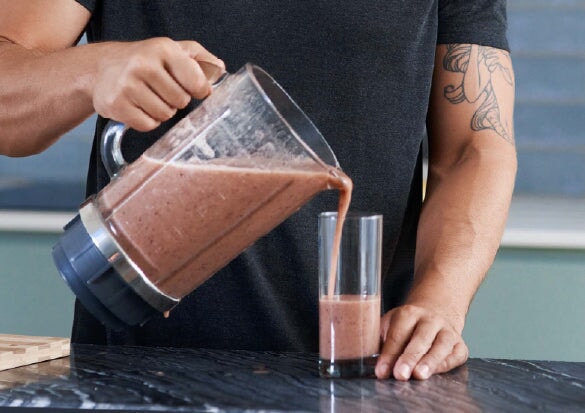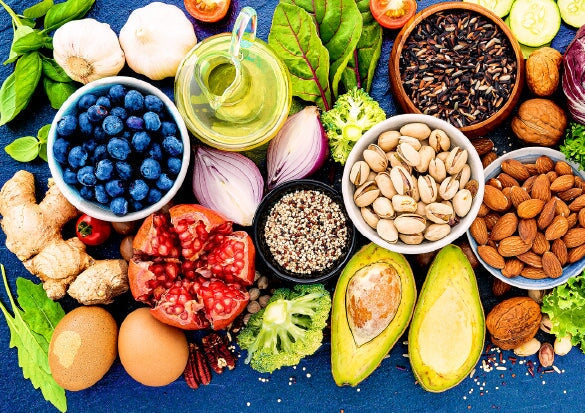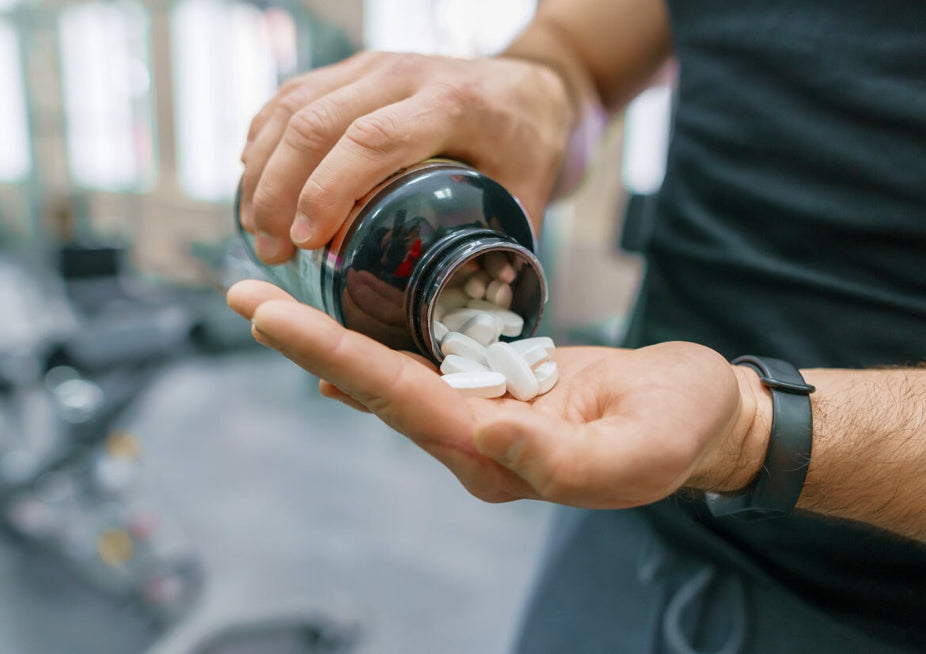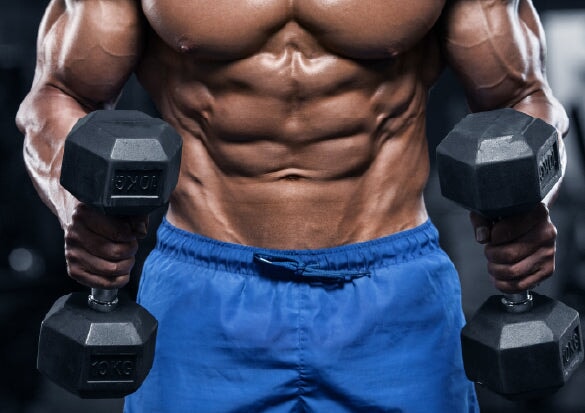Sports supplements vs dietary supplements - which ones are best for athletes?
We discuss why dietary supplements may be just as important as sports supplements in optimising your training.
When training, many athletes consider different supplements. From creatine to protein shakes, anything that is advertised to help optimise training and aid recovery is raved about within the sports community.
However, how many people consider the supplementation of day-to-day vitamins and minerals such as vitamin D and iron?
A deficiency in vitamins and minerals can leave you with several unwanted symptoms that could be affecting your performance.
Symptoms of vitamin and mineral deficiencies include:
• Weight gain
• Fatigue
• Brain fog
• Vision problems
People who are physically active generally have higher nutrient needs and therefore nutrient deficiencies can be quite common in athletes.
The most common deficiencies in athletes include [1]:
• Iron
• Vitamin D
• Magnesium
But why are these important? And why should they be considered before your favourite pre-workout drink?
Why is iron important for endurance athletes?
Iron is essential for the transportation of oxygen to muscles, as well as an important component in the creation of energy. Without enough iron in your body, your performance can be inhibited due to lack of energy and slower recovery.
What are the symptoms of low iron levels?
The main symptoms of iron deficiency in athletes are:
• Fatigue
• Reduced or poor performance
• Shortness of breath
Iron deficiency can also lead to anaemia – a condition that arises when you have a low number of red blood cells. Symptoms of anaemia are similar to those in iron deficiency but also include:
• Lethargy
• Pale skin
• Feeling faint
If you are not sure if iron deficiency is to blame for any symptoms you are experiencing, you can check yourself with a simple at-home, finger-prick test. Our Iron Blood Test can give you detailed information about your iron status to help identify iron deficiency.
What can cause iron deficiency?
1. Your diet
Certain diets can sometimes be a cause of iron deficiency.
Dietary causes of iron deficiency may be due to:
• Plant-based diets – When eating a plant-based diet, it is possible to miss out on iron as you are cutting out key sources like red meat. However, it is still possible to obtain enough iron in your diet through foods such as tofu, chickpeas, and lentils.
• Calorie-restricted diets – If you are tracking calories but not tracking the macronutrients your body is getting, then you may be missing out on foods that might seem higher in calories, but are more nutrient-dense. Therefore, if you are tracking calories, it is important to make sure you're still getting the nutrients you need.
• Substances that decrease absorption of iron – Some substances like phthalates have been found in foods like fatty meats, high-fat dairy, and fast foods. This substance has been shown to reduce absorption of iron.
2. Increased loss of iron
There are certain situations in which you can lose more iron than you absorb.
Situations that put you more at risk of increased iron loss, include:
• Heavy exercise – When exercising you can lose iron through sweating (up to 2.5 micrograms per litre of sweat!). In some cases, iron can also be lost through red blood cells being destroyed from running, as the heel repeatedly strikes the ground [2].
• Heavy periods – Females can sometimes have heavy bleeding during their menstrual cycle which can leave them losing iron at a higher rate.
3. Gut health
Autoimmune diseases such as coeliac and Crohn’s disease can affect how your body absorbs different nutrients and may therefore lead to iron deficiency. If you have one of these conditions, it’s important to keep an eye on your vitamin and mineral levels, like iron and B12.
Regular strenuous exercise may also affect how the gut works by:
• Redistributing blood flow to the muscles where it’s needed
• Reducing the activity of the nervous system that controls the gut
The effect of this may be significant enough to lead to poor absorption of important micronutrients. That’s not to say you shouldn’t exercise, but rather, you should make sure you keep well hydrated and appropriately fuelled with carbohydrates, unless specifically performing a fasted exercise.
4. Inflammation
When performing regular and intense exercise, your body’s inflammation levels increase. When this happens, your body produces something called hepcidin, which actually decreases iron levels. Therefore, it is important to make sure you don’t overtrain. You can read more in our blog on signs you're overtraining and how to recover.
How can I improve my iron levels?
Although iron deficiency can be treated by taking supplements, it is best to start with your diet first. You can get iron from both animal and plant-based sources.
Vitamin C helps the body to absorb iron. That means having foods rich in vitamin C (like broccoli, red peppers, or tomatoes) with your steak or tofu will help your body absorb as much as possible.
Animal sources of iron include:
• Lean beef
• Eggs
• Tuna
• Chicken
• Turkey
Plant-based sources of iron include:
• Beans and lentils
• Tofu
• Cashews
• Dark green leafy vegetables such as spinach
• Whole-grain and enriched bread
You can read more about plant-based diets in sports in our plant-based diets and athletes blog.
Should athletes supplement iron?
Depending on your test results and how deficient you may, or may not, be, supplements could be necessary.
Typically, an athlete with iron deficiency but without anaemia, (and with no other cause for fatigue) will start to feel better within two to three weeks of taking regular iron supplements but this varies depending on how low the iron levels are to begin with and how well the person can absorb iron. Iron absorption can also be reduced immediately after a run, so time your supplementation or dietary intake away from training sessions.
So, if you don’t think you are getting enough iron in your diet, or your Iron Blood Test indicates you are deficient, there is no harm in taking a daily iron supplement. However, iron levels should be monitored every three to six months to ensure you are not having too much iron. And, like with everything, please seek advice from your medical professional before taking any new medication.
Why is vitamin D important for athletes?
Vitamin D is a fat-soluble vitamin produced in the skin in response to sunlight and is important for maintaining healthy muscles and bones.
Having increased amount of vitamin D levels can provide athletes with many benefits, including increasing [3]:
• Strength
• Exercise capacity
• Muscle protein synthesis
• Physical performance
As vitamin D is produced in response to sunlight, in the winter months, Public Health England recommends that adults, and children over the age of one, should supplement with 10 micrograms per day.
Having low levels of vitamin D can cause symptoms that may impact your performance.
Symptoms of vitamin D deficiency include:
• Tiredness
• Low mood
• Brain fog
• Weight gain
• Joint and bone pain
You can find out if you have low levels of vitamin D with a simple finger-prick test – done from the comfort of your own home. Our Vitamin D (25 OH) Blood Test checks your levels to see whether you have low levels that could be contributing to symptoms or poor performance.
You can also find out more information on vitamin D and deficiencies in our guide.
Why is magnesium important for athletes?
Magnesium may not be a nutrient you have considered important before, but for athletes, it plays many important roles.
Magnesium helps to maintain normal [4]:
• Nerve and muscle function
• Heart rhythm
• Blood pressure
• Bone integrity
• Blood sugar levels
It also plays a role in energy production. Because magnesium is important in so many functions, it can cause several symptoms that affect your performance if you are deficient.
Symptoms of magnesium deficiency include [5]:
• Loss of appetite
• Nausea
• Fatigue
• Shaking
• Muscle spasms
Like most nutrients, magnesium is found in foods.
Magnesium-rich foods include:
• Avocado
• Nuts
• Seeds
• Spinach
• Brown rice
Should athletes supplement magnesium?
If you are getting enough magnesium in your diet, there should be no reason to supplement (unless told otherwise by your GP). Over supplementation of magnesium can cause unwanted digestive symptoms and high blood pressure.
Sports supplements vs dietary supplements – which ones are better for athletes?
If you are eating a well-balanced diet, there is no reason why (other than a health condition) you should need to supplement most nutrients. And as discussed in the are sports supplements worth it blog, there is a time and a place for supplements in sport and only a select few may be beneficial.
So, which ones are better for athletes? The answer is – it depends on the athlete. If you are not deficient in anything but still want that extra pre-workout boost, then a creatine supplement may be the one for you. But, if you are waking up exhausted, then a deficiency may be at play.
If you are looking at supplementing anything, it could be a good idea to take a blood test such as our Ultimate Performance Blood Test, to establish a baseline and check your levels and then track them over time to monitor any changes and ensure you are taking the right dose.
References
- Sports, B., 2022. 6 Common Nutrient Deficiencies in Athletes. [online] BRL Sports. Available at: <https://brlsports.com/blogs/fitness-training-nutrition/6-common-nutrient-deficiencies-in-athletes> [Accessed 16 May 2022].
- Clinic, T., 2022. Foot Strike Hemolysis - An Insidious Cause of Anemia in Athletes. [online] The Natural Athletes Clinic. Available at: <https://www.naturalathleteclinic.com/blogs/natural-athlete-solutions/foot-strike-hemolysis-an-insidious-cause-of-anemia-in-athletes> [Accessed 21 June 2022].
- Shuler, F., Wingate, M., Moore, G. and Giangarra, C., 2012. Sports Health Benefits of Vitamin D. Sports Health: A Multidisciplinary Approach, 4(6), pp.496-501.
- Volpe, S., 2015. Magnesium and the Athlete. Current Sports Medicine Reports, 14(4), pp.279-283.
- Healthdirect.gov.au. 2022. Magnesium deficiency. [online] Available at: <https://www.healthdirect.gov.au/magnesium-deficiency> [Accessed 16 May 2022].
Related tests
Are you looking to transform your body through diet and exercise and track your progress along the way?
Our Ultimate Blood Test is designed for those who want to take their health and fitness to the next level — whether you're an athlete, biohacker, or simply someone who's serious about...
- Results estimated in 3 working days
- 56 biomarkers
Venous collection
Select testDo you often feel tired, rundown, or struggle with muscle aches and pains? You may have vitamin D deficiency, especially if you spend little time outdoors, have darker skin, or are over 65 — all factors that can affect your ability to produce vitamin D
- Results estimated in 2 working days
- 1 biomarkers
Finger-prick or Venous collection
Select test

